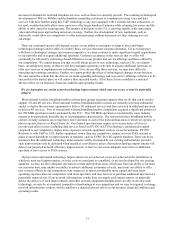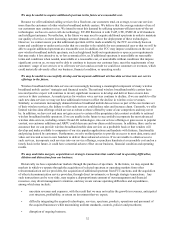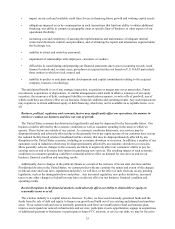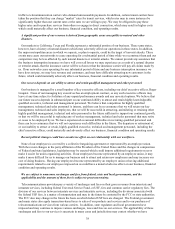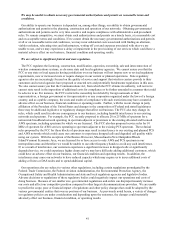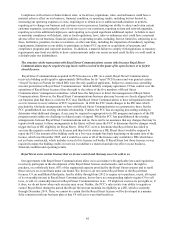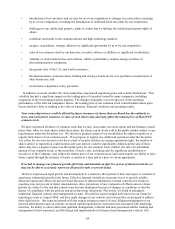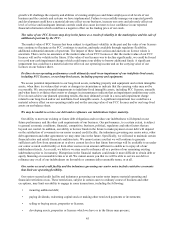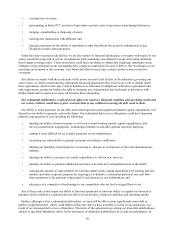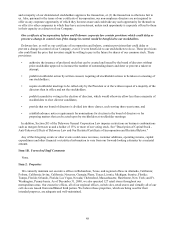Metro PCS 2008 Annual Report Download - page 50
Download and view the complete annual report
Please find page 50 of the 2008 Metro PCS annual report below. You can navigate through the pages in the report by either clicking on the pages listed below, or by using the keyword search tool below to find specific information within the annual report.41
We may be unable to obtain necessary governmental authorizations and permits on reasonable terms and
conditions.
Our ability to operate our business is dependent on, among other things, our ability to obtain governmental
authorizations and permits in the planning, construction and operation of our networks. Obtaining governmental
authorizations and permits can be very time sensitive and require compliance with administrative and procedural
rules. To remain competitive, we must obtain such authorizations and permits on a timely basis, at a reasonable cost
and on acceptable terms and conditions. If we cannot obtain the necessary governmental authorizations and permits
at all or on reasonable terms and conditions, we may incur substantial costs associated with finding an alternate,
viable resolution, relocating sites and infrastructure, writing off cost and expenses associated with sites we are
unable to use, and we may experience a delay or impairment in the provisioning of our services which could have a
material adverse effect on our business, financial condition and operating results.
We are subject to significant federal and state regulation.
The FCC regulates the licensing, construction, modification, operation, ownership, sale and interconnection of
wireless communications systems, as do some state and local regulatory agencies. We cannot assure you that the
FCC or any state or local agencies having jurisdiction over our business will not impose new or revised regulatory
requirements, new or increased costs or require changes in our current or planned operations. State regulatory
agencies also are increasingly focused on the quality of service and support that wireless carriers provide to their
customers and several agencies have proposed or enacted new and potentially burdensome regulations in this area.
We also cannot assure you that the Communications Act, from which the FCC obtains its authority, will not in its
current state result in the imposition of additional costs for compliance or be further amended in a manner that could
be adverse to us. For instance, the FCC restricts the ownership levels held by foreign nationals or their
representatives, a foreign government or its representative or any corporation organized under the laws of a foreign
country, and as a public company, the costs and results of compliance with such restrictions may have a material
adverse effect on our business, financial condition or operating results. Further, with the recent change in party
affiliation of the President of the United States and changes in the composition of Federal and stated legislatures
there may be additional legislative or regulatory changes that affect our business. The FCC also may change its
rules, which could result in adverse consequences to our business, including harmful interference to our existing
networks and spectrum. For example, the FCC recently proposed to allocate 20 or 25 MHz of spectrum for a
nationwide broadband network operating in spectrum adjacent or proximate to the existing allocated and licensed
AWS spectrum, including spectrum for which we are licensed. The FCC also has proposed service rules for 10
MHz of spectrum for AWS services operating in spectrum adjacent to the existing PCS spectrum. The technical
rules proposed by the FCC for these blocks of spectrum may result in interference to our existing and planned PCS
and AWS networks which could cause our customers to experience dropped calls and degraded call quality while
using our system. With the exception of the Boston-Worcester, Massachusetts/New Hampshire/Rhode
Island/Vermont Economic Area, we are licensed for or have access to only AWS and PCS spectrum in our
metropolitan areas and therefore we would be unable to use other frequency bands to avoid any such interference.
If, as a result of interference, our customers experience a significant increase in dropped calls or significantly
degraded service, we could experience higher churn and we may have difficulty adding additional customers, which
could have an adverse effect on our business, our financial condition and operating results. In addition, the
interference may cause our networks to have reduced capacity which may require us to incur additional costs of
adding cell sites or DAS nodes and to spend additional capital.
Our operations also are subject to various other regulations, including certain regulations promulgated by the
Federal Trade Commission, the Federal Aviation Administration, the Environmental Protection Agency, the
Occupational Safety and Health Administration and state and local regulatory agencies and legislative bodies.
Adverse decisions or regulations of these regulatory bodies could negatively impact our operations and costs of
doing business. Because of our smaller size, governmental regulations and orders can disproportionately increase
our costs and affect our competitive position compared to other larger telecommunications providers. We are unable
to predict the scope, pace or financial impact of regulations and other policy changes that could be adopted by the
various governmental entities that oversee portions of our business. As previously noted herein, a variety of changes
in regulatory policies are under consideration and depending upon the outcomes, the changes could materially
adversely effect our business, financial condition, or operating results.


